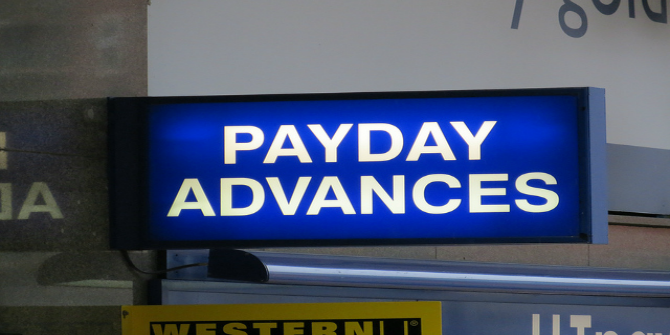

 Payday lending schemes in the UK are often vilified as expensive and exploitative, and many welcomed their regulation. But that shouldn’t be the end of it. Karen Rowlingson, Lindsey Appleyard and Jodi Gardner argue that we need to look closer at why people use these services in the first place, and suggest that we could learn from some aspects of their business model in order to improve others.
Payday lending schemes in the UK are often vilified as expensive and exploitative, and many welcomed their regulation. But that shouldn’t be the end of it. Karen Rowlingson, Lindsey Appleyard and Jodi Gardner argue that we need to look closer at why people use these services in the first place, and suggest that we could learn from some aspects of their business model in order to improve others.
The amount of credit extended via payday loans increased ten-fold between 2006 and 2012, from £0.3 billion to £3.7 billion. With eye-watering APRs routinely over 3000 per cent, this increase led to growing concerns about the cost of such credit falling on the shoulders of the poorest during a time of austerity. Various high-profile campaigns were subsequently mounted and, as a result, the UK’s Financial Conduct Authority introduced landmark reforms in 2014/15, including a cap on the cost of High Cost Short Term Credit (primarily payday lending).
These reforms have generally been welcomed as a way of curbing ‘extortionate’ and ‘predatory’ lending. However, our research, based on in-depth interviews with 21 people who had borrowed from payday lenders in the previous year, presents a rather different picture.
We argue that while recent reforms of payday lending are to be largely welcomed, we should not subscribe to the rather simplistic picture, presented by the media and many campaigners, about the ‘evils’ of payday lending. Our interviews showed, in fact, that various aspects of payday lending are welcomed by customers, given the situations they are in.
For example, borrowers in our study generally appreciated the fact that the online application process for a payday loan was simple and quick. They liked the fact that they had access to credit the same day, if not within an hour of their application being accepted. Some also liked the anonymity of the online process as they felt embarrassed or ashamed that they needed credit and did not want to feel judged. The desire to maintain dignity/avoid shame has not been previously highlighted in relation to payday lending but fits with recent research interest on the role of shame in relation to poverty. Compared with mainstream financial services, payday lenders were quick, efficient and customer-friendly, offering a service to people in need.
Quick access to credit is a well-known feature of payday loans which is much debated, with some people arguing that access might be ‘too quick’. Less attention, however, is given to another feature that borrowers also generally valued – the fact that a payday loan could be repaid quickly. Many of the borrowers we interviewed wanted to clear their debts as soon as possible and so liked the fact that the payday loan could be repaid quickly. The nature of payday loans is therefore very different to ongoing credit card debt or longer-term doorstep or personal loans.
Of course, the payday lenders were not providing this service out of any altruism but because they could make a profit from such customers. Borrowers were certainly conscious that this was a very expensive form of credit. Despite the high cost, most payday borrowers paid back their loan on time. However, some do not and so would incur (prior to the reforms) high default charges which may lead into a vicious debt spiral. The reforms are, again, therefore to be welcomed as a way of reducing the most egregious practices in the sector.
The focus on payday lending has therefore been important but it has, to some extent, diverted attention from the high cost of other forms of sub-prime credit such as: home collected (or door step) credit and logbook loans, which have not been subject to the same reform. Mainstream banks have also escaped attention with their expensive overdrafts and lack of suitable products for people on low incomes.
Finally, the reforms of payday lending do nothing to tackle the root causes of the problem which lie in: growing income insecurity for people both in and out of work; cuts in state welfare provision; and increasing financialisation. Our borrowers mentioned a range of reasons for needing money including: variable wages; insecure work (such as zero hours contracts); self-employment; loss of employment; low levels of benefit income; loss of benefit income due to cuts and sanctions; and benefit delays.
Alongside these reforms, we therefore call for other kinds of reform including an expansion, and reform, of local welfare assistance to provide interest-free (or low-interest) credit alongside further support for credit unions. This could be partly funded by the mainstream banks as with the Good Shepherd microfinancing schemes in Australia. The high cost of overdrafts, credit cards, rent-to-buy, logbook loans and doorstep lending also needs more attention as these have not been captured by recent reforms. Various other changes would also be helpful including: reducing benefit delays; providing more independent and free money/debt advice; and ensuring that utility companies effectively support people who struggle to pay bills. It is only through theoretically-informed and empirically-rigorous research that we can identify appropriate policy responses to payday (and other forms of) lending within the context of the broader mixed economies of welfare and credit to ensure responsible lending and borrowing.
____
Please note: This blog draws from the article ‘Payday lending in the UK: the regul(aris)ation of a necessary evil?’ Journal of Social Policy, 45, 3, 527-543
 Karen Rowlingson is a Professor of Social Policy in the Department of Social Policy and Social Work, as well as being Deputy Director of the Centre on Household Assets and Savings Management (CHASM).
Karen Rowlingson is a Professor of Social Policy in the Department of Social Policy and Social Work, as well as being Deputy Director of the Centre on Household Assets and Savings Management (CHASM).
 Lindsey Appleyard is a Research Fellow at the Centre for Business in Society at the University of Coventry. She is an economic geographer with interests in money and finance and how this shapes people and places.
Lindsey Appleyard is a Research Fellow at the Centre for Business in Society at the University of Coventry. She is an economic geographer with interests in money and finance and how this shapes people and places.
 Jodi Gardner is College Lecturer in Contract Law and the Law of Torts at Corpus Christi College, Oxford University. Her research centres on credit and debt, focusing specifically on the impact the legal system has on vulnerable borrowers.
Jodi Gardner is College Lecturer in Contract Law and the Law of Torts at Corpus Christi College, Oxford University. Her research centres on credit and debt, focusing specifically on the impact the legal system has on vulnerable borrowers.








I have moved onto universal credit and am currently impressed as the payment I receives takes account of my travel to work whereas my previous benefits didn’t hence I always had to live on £10 for 10 days before I get paid. I am much more relaxed and much more able to manage my budgeting. Happily, I never resorted to these payday loans but have experienced paying back other debt whilst on benefits. It wasn’t good and my stress levels prevented me from focussing on what I had to do rather than the opposite.